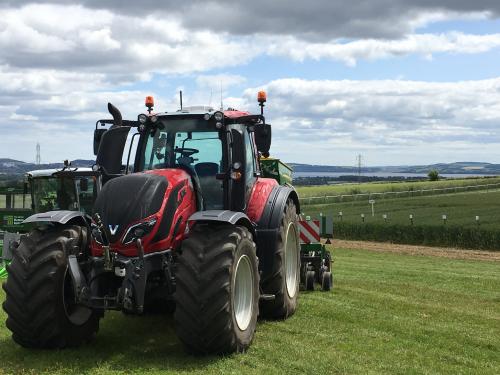The theme for this year’s Arable Scotland is ‘Innovating for the Future’. There will be three ‘Arable Conversations’ which will focus on key topics affecting the industry. The first, at 10am is focusing on ‘Adapting to the Changing Climate’ and chaired by Colleen McCulloch (independent facilitator and formerly of Soil Association Scotland), the second at midday is ‘Staying Profitable on Lower Inputs’ chaired by David Brewster (agricultural consultant) and the final slot, chaired by David Michie (NFUS policy adviser) at 3pm, will discuss ‘The Changing Policy Landscape’. In addition attendees can tour more than 100 field plots which will showcase results from research and development work on cereals, oilseeds, legumes and cover crops - and don't forget there will be plenty of opportunity to network too!
Arable Scotland is organised by the James Hutton Institute, SRUC (Scotland’s Rural College), and AHDB (the Agriculture and Horticulture Development Board) with support from additional sponsors such as SEFARI and SEFARI Gateway. Our Knowledge Broker, Kenneth Loades, is a member of Arable Scotland’s organising committee and this year he’s also arranged a SEFARI marque where you can come and talk to our researchers and knowledge exchange colleagues. Examples of some of the research we’ll be highlighting includes…..
Microplastics Pollution in Arable Soils: Cause for Concern?
Plastic usage is widespread, including in arable farming. While plastics offer several benefits, there are risks associated with microplastics introduced via the application of composts and bio-solids and their transfer from soils to surrounding ecosystems. Research is on-going, but studies are already offering insights into the potential risks associated with microplastics to soil health and living organisms. Therefore, it is time to consider suitable measures such as prioritising sustainable alternatives, re-using and recycling of plastic products to promote circular economy principles and implementing efficient waste management systems to minimise the negative impacts of microplastics. Come and speak to SEFARI researcher (Sandhya Devalla) from the James Hutton Institute to find out more.
Image: Infographic highlighting plastics in arable soils
Germinate: Storage of Accessible Genetic Resource Data
SEFARI researchers from the James Hutton Institute (Fraser Macfarlane, Sebastian Raubach, Dominic Williams and Damian Bienkowski), are exploring how image capture, analysis and visualisation can support crop improvement research. GERMINATE, the globally-established plant genetic resources database is being expanded to incorporate multispectral data from barley plots. Hyperspectral imaging is exploring soft fruit phenotyping, assessing fruit quality and plant performance and many of the analyses are underpinned by AI approaches.
Image: Field of Arable Crops
Intercropping: Could ‘Pick-a-Mix’ Work for Me?
Although the multiple potential benefits of intercrops are well established, crop mixtures are still not widely used as a farming practice. There are many reasons for this, and for farmers the question is often ‘how will this work on my farm’? To answer this, SEFARI scientists from the James Hutton Institute (Alison Karley, Sebastian Raubach, Paul Shaw, Susan Verrall, Robin Pakeman, Adrian Newton, Roy Neilson, Rob Brooker) have worked with arable farmers across Scotland to trial arable intercrops under realistic farm conditions, gathering data on intercrop yield and agronomy. They have developed the ‘Pick-a-Mix’ online tool where the database of intercrop trials can be explored in tabular, map or graphical formats. If you’d like to know more about the tool then talk to our colleagues at Arable Scotland and look out for our next blog!
Image: Welcome page on the ‘Pick-a-Mix’ online tool
Growing Hemp: What are the Benefits?
Research and knowledge exchange led by SEFARI researchers (Madalina Neacsu and Wendy Russell) at the Rowett Institute has underpinned a resurgence in the Scottish hemp sector. The researchers found hemp seeds and seed-based foods (oil and flour) to have an excellent nutritional profile with several health-supporting benefits. By working directly with producers and processors, the team are regenerating the Scottish hemp industry as a tangible solution to directly address challenges in health, climate and economy.
Image: SEFARI researchers (Wendy & Madi) at a previous Arable Scotland
In addition to SEFARI Researchers joining in the conversation at Arable Scotland, the Gateway team (Charles Bestwick, Andrew Kelloe, Michelle Wilson Chalmers, Kenneth Loades and Lorna Dawson) will be around if you’d like to discuss any wider issues or ways to collaborate.
We all look forward to talking to you at Balruddery Farm!
SEFARI Researchers and SEFARI Gateway Colleagues.
